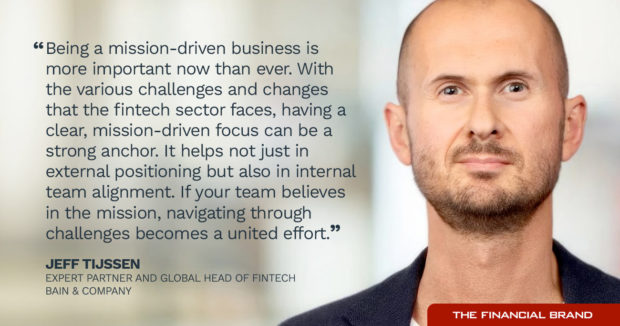Higher interest rates and economic headwinds have combined to radically alter the landscape for fintechs. Dramatic slowdowns in funding, the proliferation of “down rounds” and an increasing focus on profitability have forced many fintech leaders to re-evaluate their strategy.
Jeff Tijssen, who has spent more than 20 years in financial services, is partner and global head of fintech at Bain & Co. He began his career as a private banker in the Netherlands, before moving to the U.K. 13 years ago. There, he ran the digital platform business for Lloyds Bank, and later payments innovation for RBS.
Over the years, he has been on the founding teams of digital banks around the world. He spent three years building and running the consulting business for 11:FS before joining Bain two and a half years ago.
Tijssen shares some advice on how fintech leaders can navigate the challenges they face, in the following conversation with Jim Marous, founder and chief executive of the Digital Banking Report and co-publisher of The Financial Brand. Their discussion covers fintech funding, scalability, regulatory compliance and more.

Industry Cloud for Banking from PwC
See how PwC's Industry Cloud for Banking can help solve everyday business challenges.

Navigating Credit Card Issuing in an Uncertain Economic Environment
Build a modern credit card strategy that balances profitability and risk, adopts the latest technology and delivers the customization that cardholders demand.
Read More about Navigating Credit Card Issuing in an Uncertain Economic Environment
Fintechs Need to Grow, But Need to Do So Smartly
Q: Let’s get started with the big picture. Fintech startups are finding it increasingly difficult to secure funding and navigate regulations. What advice would you give to a fintech entrepreneur in this climate?
Jeff Tijssen: Indeed, the fintech landscape has become more challenging. We’re seeing a shift from a period of relatively easy capital raising to a more demanding environment. My advice would be to be agile and to go back to the drawing board when necessary. Assess your strategy, your target market, and the capabilities of your team. Make sure you’re not just growing but growing smartly, and that you’re focusing on the market segments where you can have a real impact.
“The fintech landscape has become more challenging. We’re seeing a shift from a period of relatively easy capital raising to a more demanding environment. My advice would be to be agile and to go back to the drawing board when necessary.”
The reality is that the incumbent players, of course, haven’t been sitting still. And some of them have done a very decent job playing catch-up. I had an interesting conversation with one of the big European banks the other day; they said, “Listen, we don’t necessarily need to be the first to market. Let the neobanks be the first ones to launch new features, new functionality. As long as we are in a position to effectively copy that, we’re perfectly comfortable with that strategy.”
See all of our latest coverage about fintechs.
‘Mission-Driven Focus’ Can Help Fintechs Survive Turbulence
Q: What can give a fintech do internally to be better prepared for managing through this environment and setting itself up for success?
Jeff Tijssen: Being a mission-driven business is more important now than ever. With the various challenges and changes that the fintech sector faces, having a clear, mission-driven focus can be a strong anchor. It helps not just in external positioning but also in internal team alignment. If your team believes in the mission, navigating through challenges becomes a united effort.
At the same time, a founder needs to ask now whether the current team can help achieve the company’s five-year vision. It’s about your entire capability set, and it’s important to have regular dialogue with your team to make sure they are aligned with your mission, strongly believe in it, and are capable of fulfilling it.
Finally, you cannot afford to overlook regulatory compliance. Have a dedicated compliance team from the start. Establish strong relationships with regulatory bodies. A collaborative approach can go a long way in ensuring compliance while still achieving your business goals.
On Finding Market Opportunities and Setting Growth Targets
Q: So how can a fintech identify and fill market gaps?
Jeff Tijssen: Founders need to have a clear understanding of the existing solutions and where they fall short. Finding gaps is not merely about identifying something that hasn’t been done before but also improving existing solutions by offering a better user experience or lower costs.
Obviously, the pandemic accelerated the digitization of financial services. Startups need to focus on solving the problems that were exacerbated by the pandemic, such as contactless payments and remote financial advising.
The democratization of financial services has also been a game-changer. Unlike the old days, where the value was siloed for reports or analytics, the new era of fintech aims to serve everyone within an organization. This broadens the horizons for fintech firms, providing an opportunity for them to deliver solutions that benefit a much larger customer base.
Q: In the current environment, should fintech startups still pursue hypergrowth or should they be more conservative in their approach?
Jeff Tijssen: It’s tempting to pursue hypergrowth, especially if you have the funding to back it up. However, I’d say that we’re seeing a pivot towards sustainable profitability. Investors now prioritize startups that not only have a compelling product but are also moving toward financial stability.
“Startups need to focus on solving the problems that were exacerbated by the pandemic, such as contactless payments and remote financial advising.”
Focus on achieving substantial growth in the markets you already operate in before planning world domination. Given the funding environment that we live in today, the ability for you to say, “Hey, we haven’t, even reached full potential in our home markets, but we’re going to plant five, six, seven flags in a whole bunch of other countries” — I think that environment has changed quite a bit.
Focus on your unit economics. While it’s great to achieve rapid growth, it’s crucial to grow sustainably. Monitor your key performance indicators closely and ensure you’re achieving incremental improvements.
And partnerships can offer a shortcut to scalability and credibility, especially when collaborating with established players in the industry. They can also provide startups with essential domain expertise they may lack, thereby allowing them to focus on their core strengths.
Read more:
- What Bankers Still Need to Learn from Fintechs
- How New Regulatory Guidance Impacts Bank-Fintech Partnerships

Investors Are Now Cautious, Even Skeptical
Q: How has investors’ appetite for fintech investment changed?
Jeff Tijssen: While the appetite for fintech investment remains robust, the metrics for what makes a ‘good investment’ have tightened. Investors are increasingly looking at fintech startups that have moved beyond the prototype stage and are demonstrating a path towards profitability. This is especially true in today’s market, where sustainability and long-term viability are taking precedence over quick, short-term gains.
Last time I checked, there were about 400 neobanks globally. The question is, ‘Do we really need 400 neobanks?’ Have these organizations really managed to disrupt the status quo” Because in so many countries around the world, the landscape is still dominated by the big four or big five.
That’s slowly starting to change, but we need to give these organizations some time to really focus on products and revenue diversification and challenge the dominant position that these big four or five organizations have had for so many years.
Q: Is the market heading towards some level of consolidation?
Jeff Tijssen: I believe we will see some market consolidation in the coming years. It will start to separate the real winners from the losers. This also creates attractive M&A opportunities both for traditional finance incumbents and other fintechs looking to accelerate their growth. Startups should not only be aware of this but should also prepare themselves for such opportunities, as they can provide avenues for rapid scaling and growth.
For a longer version of this conversation, listen to “The Future of Fintechs in Disrupted Times,” an episode of the Banking Transformed podcast with Jim Marous, available here or wherever you get your podcasts. This Q&A has been edited and condensed for clarity.








